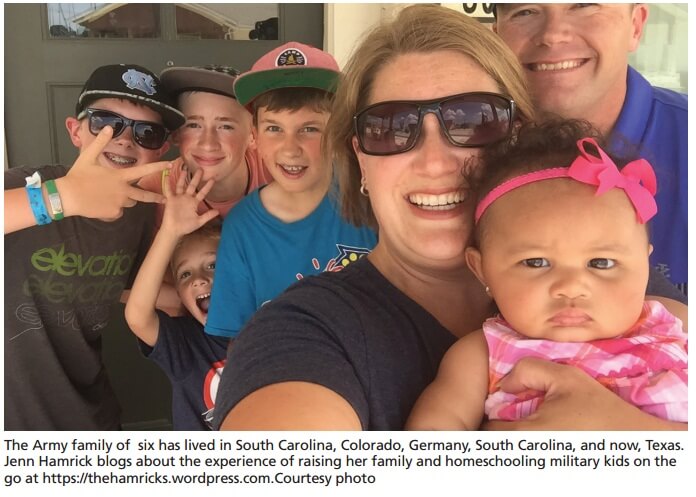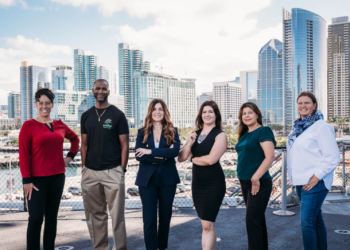Decisions about a child’s education are personal. What is best for one student, may not be a good fit for another. Luckily, today’s parents have more options when it comes to answering the questions of how and where their children will learn. Homeschooling is among those choices, and in recent years it has become an increasingly popular route for families who want more control over how the unexpected life changes impact learning.
The number of families opting to homeschool in the United States has grown in recent years. A report revealed an increase from 1.7 to 3.4 percent among school-aged children in 2012, according to the National Back to School Household Education Surveys. Although there is no separate tracking system specific to military families, experts say it is a sought after option for a number of reasons that complement the uniqueness of a transient lifestyle.
Army wife Jennifer Hamrick never envisioned she would teach her children at home. Even though the mom of five was an educator, she says it just wasn’t something she thought about — until she thought about it.
“I wasn’t opposed to homeschooling, I had a great experience myself. I just thought, ‘I’m a teacher,’ that’s what we do. We had great schools where we lived, and I’m a huge fan of public school teachers. So, I really didn’t see a need,” she said.
However, the Hamricks found out the military would be relocating them during their son’s kindergarten year. And, the family continued to experience several moves since, to include overseas and now to Fort Hood, Texas. Her approach has been to take it year-by-year, and she describes the many benefits homeschooling has provided her kids in a way-of-life with so many unknowns.
“I think first the flexibility so that when dad’s home, we can go do stuff with dad. Another one is stability because for us, with my son, when he started, he was so timid that moving him was going to be horrible from one classroom to another,” Hamrick said. “For my family, they have always known what to expect. That’s one less stressor for my children. They know that if we’re in Colorado, South Carolina, Texas, Germany — or anywhere, they know what our routine is going to look like. They don’t have that stress of trying to figure out what that school is like. For me, that’s important because there’s so much they don’t know about where they’re moving that that’s one thing I can provide for them.”
Other Advantages
Parents describe the many benefits associated with homeschooling, including a personalized curriculum adapted to their student. “My son needed a little more than a public school could provide. So he needed a little more individualization and in some places that was possible, but as we moved a lot I started to notice that the amount of time that they could spend with him was not consistent state-to-state,” Amanda Hulsey, a military wife, said.
Hulsey, who lives in Missouri, was originally in Alabama when she pulled her son out of the public school system in the 4th grade. She is now preparing to homeschool her youngest daughter this next school year, but she admits there were many things to consider before getting started.
“Once I got past the worry of it being successful – you know you always have that fear that your child may be better at public school because you’re not good at homeschooling. So, I think that is a common concern, ‘can I really do this,’ she said. “Other things to consider are what is your child’s learning style, and I knew my son really need a lot of repetition in math so I started to look for curriculum and resources that provided those opportunities. I think something else to consider – depending on where you are located in the country – are there virtual schools that are available for homeschoolers.”

Go With Your Gut
Jax Harmon, of Fort Wainwright, Alaska, made the decision to homeschool her three children — ages 4, 6, and 10 — six years ago. She says it wasn’t any one reason, but a combination of factors.
“When my first was getting closer to starting kindergarten, I started to feel the pull to [homeschooling] based on friends’ experiences with their kids’ schools, research I had done on children and play for my thesis, and learning about the gaps and overlaps that happen for military kids whose education spans several states,” she said.
Harmon explained that it was during a mid-year move, when her son would have to transfer schools that she committed to the decision. Although there have been some trials that she anticipated, six years later she is confident in the choice she made.
“Overall, I love homeschooling and the life we lead, but the fact of the matter is your kids are always around … so it can be a lot of togetherness. There are times we butt heads, too – they got their stubbornness from somewhere, after all – and we have to take a time-out from each other to keep things from escalating,” Harmon said. “The unpredictability of military life can make schedules challenging, and you have to learn to say no to good things, in addition to the bad.” But the positives outweigh the negatives we’ve encountered over the years so we’ve kept at it,” she added
Common Misconceptions
A big misconception surrounded the idea of homeschooling is that kids will be socially awkward because of limited interaction with other students. However, in 2017 there are so many different tools that many moms say this isn’t a concern.
“As a society we have it in our heads that homeschool kids are socially awkward, but the homeschooling of our childhoods is not the homeschooling of today,” Harmon said. “You will still come across the occasional awkward homeschool kid, but thanks to homeschool groups and co-ops and growing cooperation with public school activities the average homeschooler is just as “normal” as traditional schooled students.”
Military wife Jenn Woods adds that her children have connected with other students through a mix of traditional activities and ones that are unique to their duty stations.
“My kids have participated in various activities over the years — everything from scouts and fencing, to homeschool co-ops and Chinese class,” she said. “They have also traveled to almost 100 National Parks and numerous museums and historical sites around the U.S. and Europe.”

Homeschooling On the Move
Woods, who homeschools her five kids ranging from ages nine to 17, chose to teach her kids because of the frequent moves associated with military life. Her family is currently living in the Netherlands. Plus, it frees them up to travel around the demands of dad’s military commitments.
“We aren’t tied to a normal school schedule, which allows us to plan things when it’s convenient for our
family,” she said.
She also believes it helps her children devote the time to any subjects they need more work on.
“Homeschooling has allowed our kids to work at their own pace and to follow their own interests in depth,” Woods said. “The kids can spend more time on concepts that they don’t understand and they can breeze through things that are too easy for them.”
Getting Started
If you are considering homeschooling your child, there are several recommendations on getting started, according to the moms in this interview:
- Connect with other homeschooling families through social media and blogs
- Find out the requirements of your state
- Research co-ops in your area
- Evaluate your child’s learning style
- Believe in yourself.
Additional Resources
- Jennifer Hamrick’s blog: https://thehamricks.wordpress.com/
- Home School Legal Defense Association (includes a listing of each state’s rules): www.hslda.org/
- The Well-Trained Mind by Susan Wise Bauer Home School Association for Military Families: www.hsamf.org/
Read comments









































